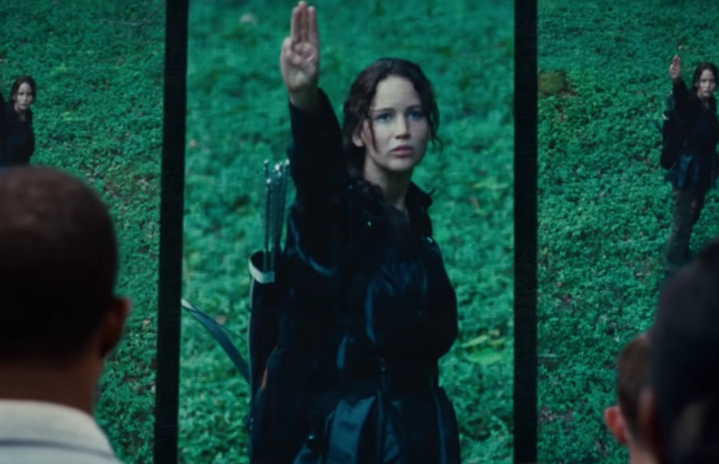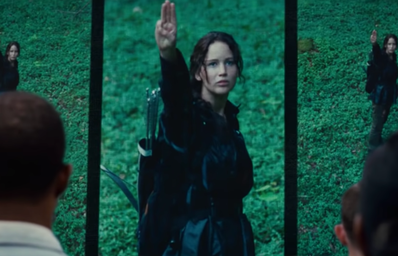When Suzanne Collins released The Ballad of Songbirds and Snakes in 2020, The Hunger Games universe was revived. Now that the movie is coming out soon, my Tiktok has been filled with video after video of people breaking down The Hunger Games and reliving what it was like to read the books and to watch it in the cinemas. I read the books when I was 10, 11 and watched the movies when I was about 13 and 14. At that age, it was the dystopian world that made The Hunger Games universe attractive, and the love triangle that ensued. Many themes flew past my head, and it was more the gruesome and violent scenes that made The Hunger Games immersive and like a fantasy world one would indulge in. Now, however, as I rewatch the films (I haven’t had time to re-read the books, but I would highly recommend you do), it is obvious that Suzanne Collins was a genius in incorporating our world’s problems, and amplifying it in the series, making it appear ‘dystopian’ and ‘far away from reality’, when it is really, just a mirror reflection of our reality.
Primarily of course, is her criticism of capitalism. Throwing kids into an arena to fight and kill one another for entertainment is reminiscent of the gladiators. However, with the touch of genetic modification and technological advancements, the Games become a genius, profit-making television show for the people in the Capitol. Through a screen, the reality of forcing children to murder one another is far away and distant, and the tributes are dehumanised to pieces in a game. It is interesting that this genre is revived again recently, in the form of Squid Game. We may criticise the Capitol or the powerful in Squid Game, but truly how different are we from them? Celebrities are often dehumanised, especially women. In Hollywood and even in Kpop, we hear of so many instances where women are used for sexual pleasures in exchange for deals. Certainly, the gladiator manifestation is extreme, but that’s the point for Collins: making it extreme doesn’t mean that the underlying principles are different, and it makes me reflect on our realities today.
A really interesting tidbit is when Snow asks Seneca “why do we have a winner?” and he reveals that having a winner allows for a glimmer of hope. Iconically, he explains that “Hope, it is the only thing stronger than fear. A little hope is effective, a lot of hope is dangerous.” This is the core of capitalism, and in extension, meritocracy. We are taught that as long as we work hard, we would have stable lives, good careers and good money. Entrepreneurship modules in NTU try to entice us to take that career route because it could lead us to becoming a millionaire one day. Everyone is clinging on to this perceived hope that as long as we work hard, we will become a Kardashian someday. To some extent, we fulfil that dream. We earn enough money to buy expensive things now and then, and we can afford to go overseas once in a while. But still, in essence, we remain slaves to this machine called Capitalism, and work ourselves to the bone to turn it. But no one fights capitalism. In one way or another, we are all tied to it, and we all remain slaves to it. And it is solely because there is a possibility that we may be successful one day, and we may be part of that 1% of wealthy people on earth. It is why rags to riches stories are popular, or why the Straits Times loves to write stories about ITE graduates going to law. It creates a perception of hope and possibility that doesn’t truly, or always, exist.
Beyond her wonderful criticism of capitalism, watching the films now has made me realise how beautiful the character building in The Hunger Games was. Mainly, Peeta’s and Katniss’ characters have been perhaps the most real characters I have seen in literary works so far.
The beauty in Katniss’ character is that she is so flawed. She is hot-tempered, impulsive, hates authority and sometimes throws tantrums (usually at Haymitch). But she also loves hard and stands firm with her beliefs, and it is that very hate for authority that allows her rebellion to become a symbol for everyone else as she transforms it into the Mockingjay. She makes mistakes and hurts people, just as we all do. At her core, however, she has always been trying to do what she felt is right, and that often gave strength to others. It is difficult to resist the norms when everyone is just following along. Katniss gives me, and many others, strength to try and do what we feel is right. Katniss also had the ability to view situations from a bird’s eye view. There was always animosity between the districts, but she put that aside to remind everyone who the real enemy is. We need this kind of mindset. A society divided by either racial lines, ideological lines, religious lines etc. is a society that is easily controlled and manipulated, and I believe our generation is beginning to recognise that banding together and fighting the true enemies is what moves society towards a more progressive route.
Finally, I must talk about Peeta. When I read The Hunger Games at 11, Peeta was that original golden retriever boy. He was soft, kind, and loving, and at times, his character seemed weak and overwhelmed by Katniss. Many, including myself, wanted Katniss to end up together with Gale because of how passionate their short relationships were, and how their strong personalities seem to pair up and be on par with each other. Growing up however, I realised that Peeta was just perfect for Katniss. He gave everything to her, and more importantly, he loved her selflessly. While Gale was jealous and hated Peeta for loving Katniss, Peeta respected Gale and even gave Katniss a pendant with Gale in it. He recognised the people important to Katniss. Instead of allowing possessiveness to overcome him, he just wanted Katniss to be loved, even if that means by his competitor. In today’s world where cheating, possessiveness and controlling nature are prevalent in our romantic relationships, Peeta is a rare gem that sets a standard we should work towards. He never pushed Katniss for a relationship even though he loved her deeply, and it is simply because he respected her. He didn’t always agree with her, but he respected her as a person beyond an object of his interest, and that is so very needed in our society today, which is filled with misogynistic ego and entitlement. Peeta was neglected by his family. He never felt loved. Yet, that did not change his kindness. His constant belief in humanity is something I want to have too.
Peeta represented peace, Gale, war, and Katniss, humanity. Humanity can choose to go either way, but ultimately choosing war would burn us to the ground. If Katniss had chosen Gale, he would have burned a fire through her, and it would have destroyed Katniss’ kindness and compassion for others. Choosing Peeta allowed her to flourish as an individual. Katniss may superficially seem like a hard and tough character, but this is mostly because she is in survival mode. Underneath all that anger, is a girl who truly loves people and has deep empathy and compassion for them. Peeta brings out the best in her. In some ways, humanity is just like Katniss. We are often mean and nasty to one another, but deep down, a majority of us wish the world would just love each other. Peace may seem boring, or even weak; tedious almost as Katniss puts it. But it is worth it to feel secure and at ease, and to truly live.
I could go on and on about The Hunger Games, but the essence of it is this: Suzanne Collins puts our world so poignantly into words, and she is a wonderful genius of a writer for it. I will never get over The Hunger Games — it is indeed a timeless classic that brings new insights each time you read it.


